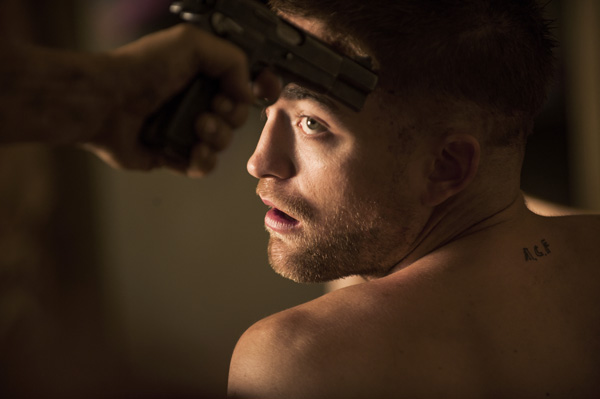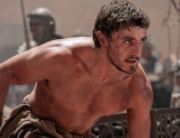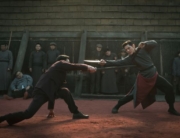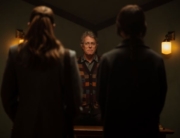With The Rover, David Michôd strips down and ventures beyond the Thunderdome in exploring the human detritus left 10 years after the global economic and environmental collapse of the Asian Century. Australia has long been the end of the road for movie apocalypses, like in the garish images of George Miller’s 1980’s “Mad Max” series. Before yet another Max sequel comes out next year, writer/director Michôd (Animal Kingdom) descends into the psychological damage from rapacious resource mining.
There’s always a bar at the end of the universe, and Guy Pearce (his name here is Eric, but he’s like the classic Man With No Name) drives through the scorching desolate desert to reach it. While he’s trying to get a drink amidst blaring Chinese karaoke (there’s various Asians scattered throughout the landscape as reminders of who was last on top), his car is stolen. A man’s gotta do what a man’s gotta do, and he determinedly starts off on an odyssey chasing down the speeding thieves in their abandoned pick-up truck.
The film swivels back around in time and perspective, and we’re thrust inside Eric’s truck with the motley arguing armed thieves, bloody from an earlier robbery gone very bad: the older grizzled Archie (David Field), the African Caleb (Tawanda Manyimo), and the American southerner Henry (Scoot McNairy). Eric efficiently tracks them with military skills and shoots with sniper precision, and he finds a useful clue to hunt them down—Henry’s seriously wounded and abandoned brother Rey (Robert Pattinson, well-played by Pattinson, though his southern accent is unnecessarily thick).
Eric and Rey develop an uneasy partnership to get back that car. The taciturn older man sticks to his own moral code, whose rules are only gradually revealed, and the nervous, needy Rey’s mental instability reflects the crazy world he’s grown up in. In this kill-or-be-killed surreal wasteland, vendors of bartered goods are invariably armed to the teeth, and the slightest untoward sound sets off Eric’s uncannily automatic shooting reflexes (sometimes nick-of-time justified, sometimes disturbingly brutal). The women who help them seem startlingly normal and businesslike: Dot (Susan Prior), a doctor; and the cynical Grandma (Gillian Jones), but they are predictably doomed, like just about everyone here, including children.
Eric uses the opportunity of being taken in by a soldier (Anthony Hayes) to relieve his conscience, but in this world the problems of three little people don’t amount to a hill of beans. His confession gives chilling context to his stubborn insistence on recovering his car and its contents. (The story is co-written by the busy actor/filmmaker Joel Edgerton, whose script for his upcoming starrer Felony tackles parallel moral issues in contemporary law and order.)
The craggy red scenery of South Australia’s Flinders Ranges looms over the human chaos (filmed by cinematographer Natasha Braier in beautiful 35 mm), in a reversal of John Ford’s portrayal of civilization encroaching upon Monument Valley. Despite the use of familiar cinematic tropes of rootless post-civilization, the grim and violent emphasis of desolation and destruction make this a thrilling road trip through the outback of the near future.







Leave A Comment